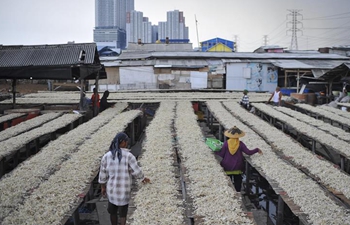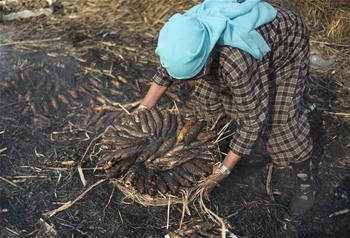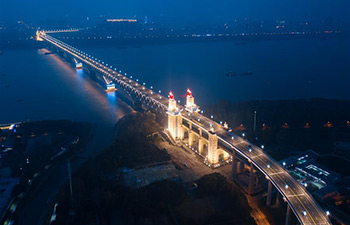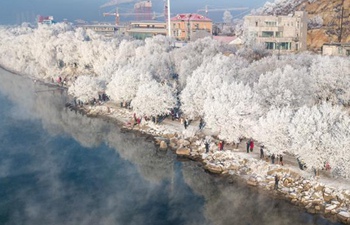
Zimbabwean President Emmerson Mnangagwa speaks at a press conference in Harare, Zimbabwe, Dec. 18, 2018. Zimbabwe's military used disproportionate force in quelling post-election violence that occurred on Aug. 1 in Harare, resulting in the death of six people and damage to property, according to the Commission of Inquiry report released Tuesday. (Xinhua/Shaun Jusa)
HARARE, Dec. 18 (Xinhua) -- Zimbabwe's military used disproportionate force in quelling post-election violence that occurred on Aug. 1 in Harare, resulting in the death of six people and damage to property, according to the Commission of Inquiry report released Tuesday.
Releasing the report's findings and recommendations to the media, Zimbabwean President Emmerson Mnangagwa said the death of the six people and injury of 35 people in the violence "arose from the actions of the military and police."
"The government deployed the military in accordance with the constitution and applicable law. However, the use of live ammunition directed at people especially when they were fleeing was clearly unjustified and disproportionate," the president said.
The report, however, observed that the deployment of the military to assist the overpowered police in containing the riots was justified given the rapid escalation of the situation in a very short space of time.
According to the findings, the post-election violence was pre-planned and well orchestrated. It was also not sanctioned by the police.
It was clear that many demonstrators became riotous and caused substantial damage to property and there was serious threat to public safety, the report noted.
"It was clear that had the riots not been curbed, the situation could have escalated resulting in disastrous consequences," said the report.
The report noted that military deployment could only have been avoided if the police were adequately experienced, better equipped, sufficient in numbers and more suitably organized.
"While recognizing that in the circumstances, the deployment was unavoidable, the Commission considers that it would have been preferable if the police had been able to deal with the situation on their own."
The report noted that while the deployment was lawful, the operational framework in terms of the law was not followed in that the deployed troops were not placed under the command of the regulating authority due to time constraints.
The Commission also found that fake, fabricated and biased news on social media contributed to the violence.
"Having considered all the evidence, the Commission found on a balance of probabilities that speeches made by political leaders, mostly the MDC Alliance before and after the elections, heightened tensions and played a part in inciting some member of the public to protest," the report noted.
The report recommended compensation to all the affected victims and dependents and urgent availing of medical support to all the injured.
It recommended registration of all political parties to ensure accountability of party leaders and enforcement of nationwide campaign to raise awareness and educate people on proper parameters for peaceful demonstrations.
The report also recommended the review of all laws relating to hate speech, abuse of cyber space and incitement to commit acts of violence.
In addition, police should be equipped with necessary skills and capacity for dealing with rioters while use of the military to assist police in maintaining public order should only be a last resort in extraordinary situations, the report noted.
Use of live ammunition as warning shots should also be discouraged, the Commission recommended.
The seven-member Commission was chaired by former South African President Kgalema Motlanthe. The Commission began its work in September and concluded in late November.











